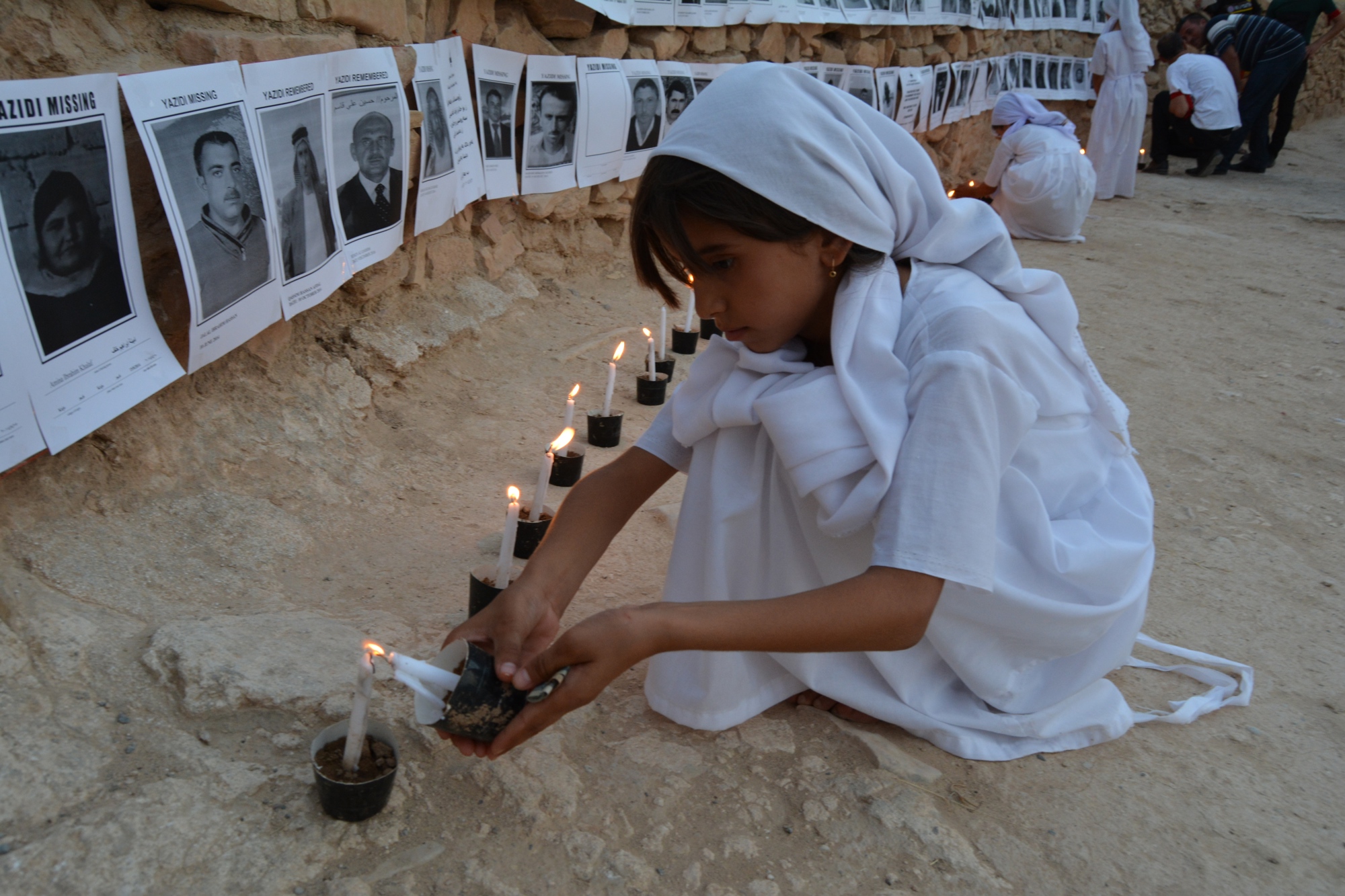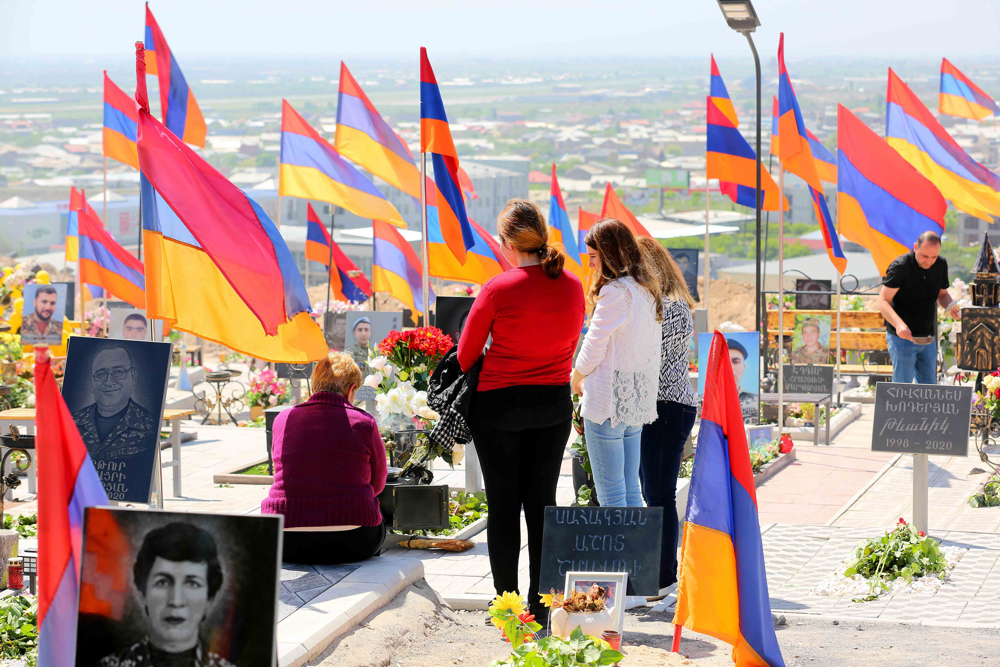Humanitarian aid alone cannot save communities from atrocities
Lynn Zovighian on the case for philanthropy to support genocide-affected communities
Monday, 09 December 2024

Lynn Zovighian on the case for philanthropy to support genocide-affected communities
Monday, 09 December 2024

 Lynn Zovighian is the co-founder of the Zovighian Partnership (ZP), a family business enabling public and private philanthropy and impact through community-led research, strategy and policy innovation, and governance in KSA, the UAE, and wider region. She is also the founder of her family’s philanthropy, the Zovighian Public Office, serving groups facing crimes of atrocity, especially the Yazidis of Sinjar, Artsakhi Armenians of Nagorno-Karabakh, and vulnerable groups in Lebanon. Listen to Lynn discussing her philanthropy and her work in crisis-hit communities on our podcast, Shaping Philanthropy.
Lynn Zovighian is the co-founder of the Zovighian Partnership (ZP), a family business enabling public and private philanthropy and impact through community-led research, strategy and policy innovation, and governance in KSA, the UAE, and wider region. She is also the founder of her family’s philanthropy, the Zovighian Public Office, serving groups facing crimes of atrocity, especially the Yazidis of Sinjar, Artsakhi Armenians of Nagorno-Karabakh, and vulnerable groups in Lebanon. Listen to Lynn discussing her philanthropy and her work in crisis-hit communities on our podcast, Shaping Philanthropy.
Sieges and blockades. Starvation as a weapon of war. Mass displacement. Illegal seizure of land. The destruction or decapacitation of hospitals and schools. These are all long-time strategies to intentionally harm a group in part or in whole. In the past couple of years, highly sophisticated and accurate military technology, intelligence, and unrestricted power, complicity, and impunity have taken these age-old approaches to new levels of effectiveness, danger, and inhumanity across the Middle East and South Caucasus.
Targeted communities are not able to keep up. Nor is international law and order. And diplomacy has been rendered close to redundant. The United Nations's International Day of Commemoration and Dignity of the Victims of the Crime of Genocide and of the Prevention of this Crime, observed every year in December, is a painful reminder that the world continues to fail communities facing atrocity crimes.
Despite the widespread digitalisation and global broadcasting of violence and suffering, especially in this past year from places like Gaza, philanthropic funding for communities, their grassroots organisations, and their socio-economic institutions has been slow to materialise.
"Perpetrators of genocide invest heavily in propaganda and misinformation to conceal the truths and lived experiences of those they are targeting. Countering this must begin with community-centered and rigorous investigative research."
At the Zovighian Public Office, we have spent the last almost 10 years working to safeguard communities facing atrocity crimes in the Middle East and South Caucasus, and through this experience, have learned how to overcome major challenges to reach, understand, and elevate endangered communities.
Perpetrators of genocide invest heavily in propaganda and misinformation to conceal the truths and lived experiences of those they are targeting. Countering this must begin with community-centered and rigorous investigative research.
Investing in data is paramount to clearly understand what is really happening on the ground and is instrumental to informing global stakeholders who are much less likely to fund time-critical research, such as prosecutors and diplomats.
This research teaches us much earlier on in a violent and high-stakes environment which community organizations and leaders can serve as indispensable allies given their wisdom, proximity to the crimes, and humanity.
It also allows us to possibly work from a stage of prevention before atrocity crimes become graver, more widespread, and more overwhelmingly dangerous. With more data, we can also work more safely and precisely, with much higher impact.
In 2015, for example, we conducted a review of the declared theological claims by Da’esh (also known as the so-called Islamic State) and discovered that the sexual exploitation and trade of Yazidi women and girls was not only for the group’s economic benefits, but as a weapon of genocide against the entire community.
This data allowed stakeholders to quickly shift their strategies from addressing the crisis as one just of sexual violence, but as a systemic strategy for the harm and destruction of the Yazidis as a whole.
Likewise, in 2022, only four weeks before the blockade of Nagorno-Karabakh against Armenians by Azerbaijani state actors, we issued a clear alarm to the international community to heed to systemic efforts to significantly harm the indigenous community.

The Zovighian Public Office has worked extensively to support Armenians in Nagorno-Karabakh who have been subjected to systemic harm by Azerbaijani state actors.
Without an upfront investment in high quality community-centered research, philanthropists cannot engage fast enough in a supportive and empowering role for communities. The risk of a philanthropist also giving up is much higher because it becomes too hard to achieve impact.
According to a research study we published earlier this year, only 14 percent of next-generation givers in the Middle East fund human rights-based causes, 10 percent fund international humanitarian aid, and only 30 percent engage community leaders and beneficiaries in their decision-making. The gap between the needs of communities and the capital of funders is enormous.
In conflict zones, communities have no easy means to bridge the gap. With philanthropic funding so limited, humanitarian aid is often the only recourse. In such complex emergency environments, risk aversion leads to highly conditional, short-term, and reactive funding, that is neither strategic nor empowering. This leaves communities fighting for their lives with an additional burden of jumping through hoops to satisfy their donors.
Tough proposal thresholds to receive funding from international agencies and humanitarian funds demand time, resources, and a clear head, things in short supply among communities facing atrocity crimes.
Smaller community organisations can struggle to access aid funding because they lack the structure or proven track record required by international agencies and donors. This is despite these entities often forming in response to a crisis and therefore possessing the lived experience and knowledge of how to deliver meaningful change.
"In partnership with affected communities, philanthropy can make a difference no other group or force can."
Once a war or genocide becomes old news and the world begins to move on, aid funding typically starts to wind down because institutional funders are now demanded elsewhere. Affected communities then find themselves struggling with even less oxygen than before and are thus more vulnerable to future exploitation and abuse, while their perpetrators once again have the upper hand.
This is where strategic philanthropy can play a role. It can help communities build resilience and capacity and enable them to take their lives and futures into their own hands. It can think much longer term, beyond today’s atrocities and already look far ahead on how community can be rebuilt and strengthened, so that they can thrive. Philanthropy can understand and absorb risk that others cannot.
Without more patient and unrestricted philanthropic funding for endangered communities facing atrocity crimes, might will continue to be right, and impunity will continue to persist.
If history has taught us anything, crimes of atrocity will continue to be inflicted on communities by powers significantly larger than all of them combined. It is therefore our indispensable responsibility as philanthropists to step up and start to pave the path to quickly come as close as we possibly can to endangered communities.
In partnership with affected communities, philanthropy can make a difference no other group or force can.
In a region and world that desperately needs a re-imagination of true justice and lasting peace, I dare to still hope that my generation will not have our children inherit failures in war, failures against humanity, and failures in genocide.
Grounded in tradition, looking to the future: understanding next-generation philanthropy in the Middle East is a first-of-its-kind report seeking to close the data gap on philanthropy in the Middle East and and create a new baseline for research on regional giving. Produced by Zovighian Partnership and the Pearl Initiative, with support from the Bill & Melinda Gates Foundation, the report surveyed 83 next-gen changemakers. Read the full report here.
It's a good idea to use a strong password that you're not using elsewhere.
Remember password? Login here
Our content is free but you need to subscribe to unlock full access to our site.
Already subscribed? Login here
Sign in to access all of our content and resources.
Not subscribed? Register here. Forgotten your password? Reset here
Simply provide your email, and we'll send you a link to reset your password.
Remember password? Login here